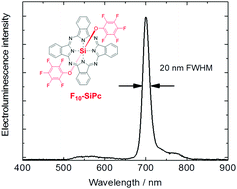Silicon phthalocyanines as dopant red emitters for efficient solution processed OLEDs†
Abstract
The optical characterisation and device functionality for a series of axially modified silicon phthalocyanines (SiPcs) as dopant red emitters in solution-processed and vapour-deposited organic light-emitting diodes (OLEDs) is presented. Control over the axial group composition enables bandgap maintenance around 1.8 eV and photoluminescence quantum yield values of up to 66% in solution. We confirm efficient energy transfer between a polyfluorene host matrix and a SiPc dopant under photoexcitation, and demonstrate solution-processed OLED devices with narrow electroluminescence spectra (20 nm full-width at half-maximum) close to 700 nm. Vapour-deposited OLEDs based on TCTA as host exhibit characteristic SiPc emission around 715 nm, but with greater spectral contamination from the host. An initial OLED optimisation exercise demonstrates external quantum efficiencies of up to 2.5% in solution-processed devices, indicating that such phthalocyanines may prove promising red dopant emitters for OLEDs with high colour purity.



 Please wait while we load your content...
Please wait while we load your content...